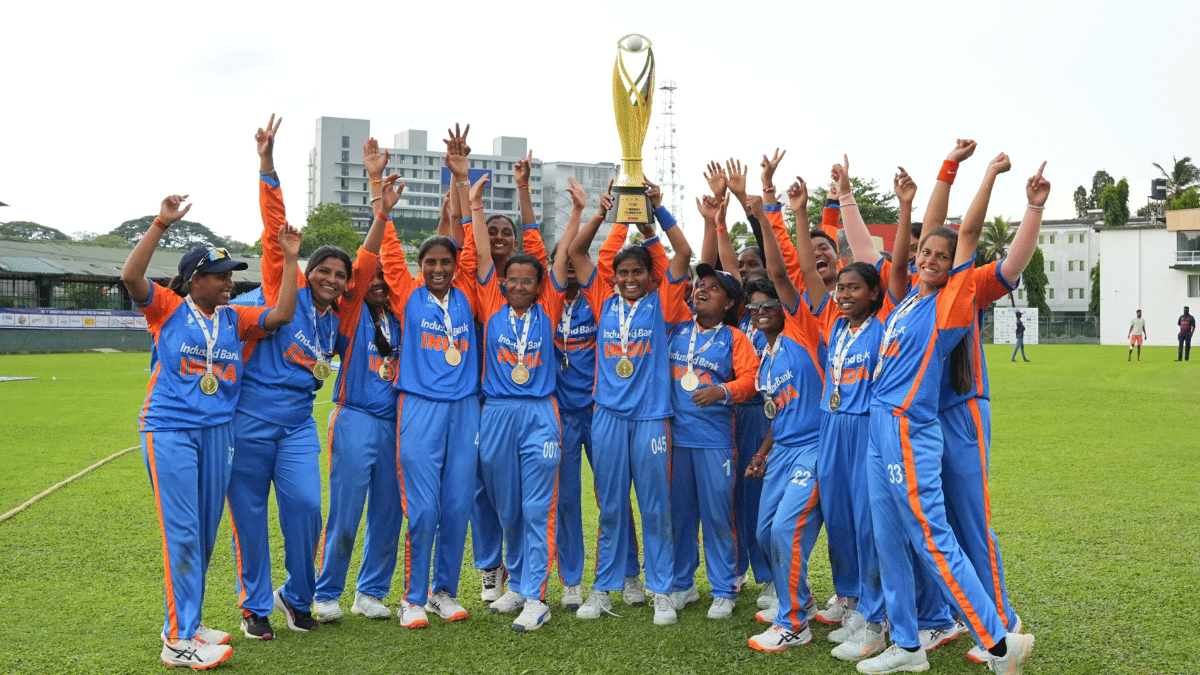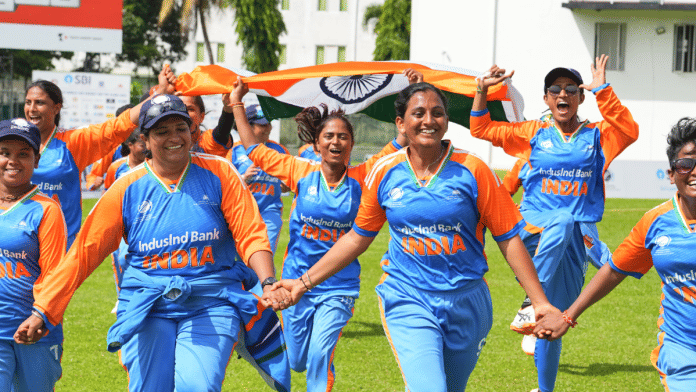New Delhi: They neither had enough bats, nor enough grounds to play on. Still, the Indian team knocked it out of the park, winning the first ever Blind Women’s T20 World Cup this month.
The Indian women’s team, led by Deepika T.C, dominated the tournament, in which five other teams participated—Nepal, Pakistan, Sri Lanka, Australia and the US. India defeated Nepal by seven wickets in the T20 final, held in Colombo on 23 November.
“We now demand support from BCCI and ICC to support our team, so that we can bring more pride to the country. We don’t have grounds. We don’t play enough matches, and we didn’t even have enough bats ahead of the tournament,” Sunita Sarathe, a fielder who took eight wickets in the competition, told ThePrint.
Sarathe, speaking after each player in the 16-member team was awarded prize money of Rs 1 lakh by Nora Solomon Foundation, belongs to Madhya Pradesh’s Nayagaon.
The 28-year-old, who had weak eyesight from birth, wasn’t a long-time player. She explored multiple jobs before joining a blind cricket camp on a friend’s recommendation.
Sarathe struggled and doubted her potential initially, but she kept showing up.
Her idols, she said, were India women’s national cricket team players—Harmanpreet Kaur and Smriti Mandhana. “I started playing cricket after watching Harman di,” she said.
Sarathe said that India’s win in the Women’s Cricket World Cup on 2 November boosted the team’s morale.
In ‘blind cricket’, players are grouped by the degree of sight—B1 is for those who have fully lost sight, and so on, as B2 and B3 (Sarathe is a B2 player). Teams have to field players from all three categories for specific roles.
In addition, the sport requires the use of a plastic ball with metal bearings that jingle.
Also Read: From ‘chokers’ to champions—how the South African cricket team has undergone a transformation
All adoration now
Back in Sarathe’s native village, her family has been showered with appreciation since the team won the World Cup.
The fielder said her family hadn’t realised the scale of the tournament.
“After the win, villagers and relatives are constantly visiting to congratulate my parents. Sarpanch sahab also met my parents and said that I have made the whole village proud. This is an emotional moment for me. Our hard work is finally paying off. My parents are proud because of me,” Sarathe said at Friday’s event in New Delhi.
Also in attendance was the team’s physiotherapist Rajshree Ramavat. She told ThePrint that the World Cup win was a “milestone” and “historic” moment that will be remembered for years to come.
“This victory is a slap to everyone who doubted these women… who pitied them. Their relatives would say, ‘What can women do, that too specially-abled? They are of no use’. These women have answered them by winning the World Cup,” Ramavat said.

The team had been preparing for the tournament since 2023. They endured many battles, both physiological and psychological, before this.
“The plastic balls hit really hard on the body. Despite knowing that, B1 category players used their entire body to somehow stop the balls. They didn’t care about getting hurt. The team was determined to win at any cost,” Ramavat said.
The physiotherapist lauded the team’s captain, Deepika T.C, for keeping her squad motivated.
“She is the glue, the backbone, who held the team together. She has given time to each player, literally held their hands and provided guidance. There couldn’t have been a better captain than Deepika,” Ramavat said.
Developer Chintels India, which organised the event as part of its CSR (corporate social responsibility) arm, had extended its support to the team.
“The team’s victory is a proud moment for India. We are honoured to have played a small role in their journey. Apart from the cash prize today, we had provided them kits, including bats, and extended any form of support that was required from us,” said Prashant Solomon, director, Chintels India.
On 27 November, the squad met Prime Minister Narendra Modi to celebrate their victory. The players presented the PM with an autographed bat, and he signed a ball for them.
“Congratulations to Indian Blind Women’s Cricket Team for creating history by winning the inaugural Blind Women’s T20 World Cup! More commendable is the fact that they stayed unbeaten in the series,” PM Modi had written on X.
The day before, the team also met Congress leader Rahul Gandhi, who congratulated them on their achievement.
The Cricket Association for the Blind in India (CABI) is the apex body that governs cricket for the visually-challenged in India. It is affiliated with World Blind Cricket (WBC).
(Edited by Prerna Madan)
Also Read: Chopping, changing & chasing illusions—Gambhir’s fixations laid bare as India’s Test aura fades






